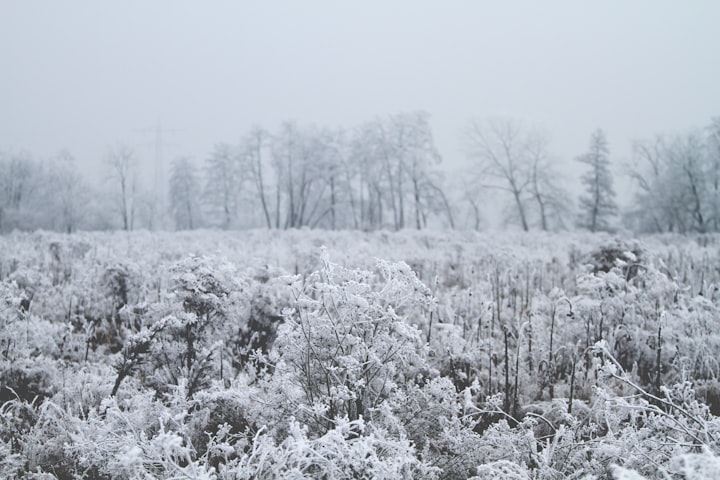she's been here a long time
haunting. waiting. yearning.

She’s been here a long time.
Years beyond counting.
She’s seen children sleep away their first night upon this Earth in the nursery, painted with gentle flowers and washed silver by the moon.
She’s seen those same children grow old and drift away on spring evenings or quiet midsummer mornings, their faces to the sun and the rocking chair by the window creaking softly to silence.
She’s watched through the hoar frost of the attic window as the groundsman slouches off into the birch forest and the white meadows beyond, shotgun clattering on his shoulder and tawny hound bounding along at his side through the falling snow. Cold winter mornings were they, and as the dog and the man in the tweed suit faded into the flurry she’d rest her palm against the glass and pretend she could feel the chill of it. Pretend she could see her breath fogging among the frost. The house had settled around her, and the smell of old, splintered wood had filled her lungs, and she’d let her hand slip away.
She’s watched from the window at the top of the stairs as new children play in the springtime flowers, the marigold and snowdrop and cowslip. Bright, golden mornings were they, and as the brother and sister squealed and laughed and shrieked she’d rest her palm against the glass and pretend she could feel the warmth of it. Pretend that if she were to walk out the great front door, the finches would alight, and the sparrows would sing, and the garden would sway around her ankles like she were a living thing just the same as it. The maid had rushed through her, skirts bunched in her fist, and the smell of frayed old carpet had drifted up from the entryway, and she’d let her hand slip away.
She’s watched it all fade to nothing.
One early summer morning, the maid carried the children’s cases down the stairs, and the brother and sister came wandering down for the last time, and when the mother pulled close the front door the key turned in the lock, and then they were gone. She drifted down to the narrow strip of glass beside the door and watched them go, and all day and all night she waited. For the tinkling of the little bell at the front of the carriage; for the crunch of gravel under the wheels; for the chattering of the children as she welcomed them home with a smile and they ran through her.
They didn’t come back.
She spent a long time waiting.
The years drifted by. The house grew older. The attic roof caved in, and try as she might to stop it – try as she might, with sobs and screams that went unheard and hands that passed right through them, to carry pails up the stairs and collect the droplets – all she could do in the end was stand among the eaves and watch as the rain poured in. The bannisters on the stairs soon followed. The ceiling in the entryway buckled in, and the front door sagged on its hinges, and ivy pushed its way through the windows of the old, quiet nursery. And as the years passed on, her house went with it.
A hundred years more, and she would be left among the heather and the meadowsweet, in the ruins of an old, nameless house. The timber will decay and slip away, the glass will lose itself in the soil, and she alone will stay the same. In a forgotten shell that used to be loved.
She’s watched as people pry aside the front door and slip aside, with wide eyes and trembling grins. “Do you think anyone died in here?” they whisper, as they wander at first with irreverence and then with solemnity through the buckled old rooms, fingers brushing over books and picture frames. They come here rowdy and defiant, sliding down the bannisters and thumping dust plumes from the furniture, and slowly, silently, the sadness settles over him. It’s always the same.
They feel the haunting.
She drifts along behind them, grey and forgotten, wandering through her own life as they pick up and study little pieces of it for the first time, and watches with a quiet brand of melancholy as they slip away in the early hours.
She’s watched as people less gentle pull and tear at the timbers. “It’s here,” they say, wrenching up the floorboards and tossing them aside when they crack. They gut the house open from the inside, and as the dust clears she drifts over to their shoulders and peer into the black, gaping hole. Her heart weeps. “It’s here. It has to be. You’ve heard the stories – they all say it’s in the heart of the house. This is as much a heart as I’ve ever seen, don’t you think?”
She’s heard the stories, too, from the lips of strangers who come in the night with hammers and beams of fire light. A great treasure, lost in the dark of an old, haunted house. She’s tried to stop them, tried to plead and push candles from the mantelpiece, but they don’t hear her. Now, there’s holes in the floor of every room. She stands at each of them and weeps into the silence.
“Is this it?” one of them says, from the dark of a hole beneath the entryway floorboards. “Is this bloody well it? Five grand, ten grand, twen— there’s got to be twenty grand buried down here.” He reappears shaking a little metal box and beaming the devil’s own grin; his face is a horror of shadows and torch light. “Twenty bloody grand, Tommy. All for the price of a little human ingenuity.”
They run through her and out into the night.
She’s watched as softer souls come to sit with her. “It’s haunted,” they whisper to their companions, and she settles down beside them with her knees drawn up to her chin and listens. “Can’t you feel it?”
“All I can feel,” says one girl, as she slinks along beside a sideboard and runs her fingers over the dusty remnants of a dozen forgotten lives, “is that I should’ve trusted mum and worn another jumper.”
“No, but it’s true,” says the other, and as she looks around the room her eyes pass over the woman sitting beside her and don’t linger for a second. She smiles, sad and small. “This house is four hundred years old – it’s seen kings and queens and poets and wars. It was here when forests were all around us, when London was still timber and there were carriages on the lane outside. It was here when the bells were still ringing in Old St. Paul’s. It was—”
“You’re such a nerd,” the first one sniggers, and the woman with the name lost to time smiles at the fondness of it. The midnight wind howls through the holes of the attic; the first of winter’s frost burns on the meadow grass and turns it dry; a cold breeze stirs dust from the old logs in the fireplace and sweeps it across the moth-eaten rug. The girl on the floor pulls her legs in closer; the woman beside her does the same, just to feel human.
“It’s haunted, alright? I just know it. There’s someone here, someone sad and lonely. Someone who used to have a mother, and friends, and a bedroom—”
Her voice fades into the background. The girl at the sideboard has brushed open a little black book, old and battered and creased. She studies it for a moment before moving on to fiddle with an old reading lamp. Rising slowly to her feet, an old brand of grief budding her throat and making her chin pucker, the nameless woman drifts over to the sideboard and looks down at the book. The writing has been faded by time, the pages wrinkled and water-stained, but it’s the same.
“Thank you,” she whispers, turning her head to look at the girl. It’s the first time she’s spoken in years; her voice sounds like that of a stranger, fragile and pale. She doesn’t hear. “Thank you,” she whispers again, and the words catch on the edge of a wail. Her face cracks into a broken, sobbing smile. “Thank you.”
She looks back down at the book, runs a finger over the pages that disappear through the ink. She gave up trying to open this book two centuries ago. It’s only a page – only a single page – but it’s enough. It’s something. To read her mother’s hand, to see her own name written down on something real, to remember the morning it speaks about – golden spring sunlight and the ginger tabby cat purring in the flowerbed outside the library window and the village boy shouting for her from the fence past the pond—she closes her eyes and raises her head to the cold night sky beyond the buckled ceiling and weeps with relief.
As the months pass by and winter fades to spring, those girls stop coming, too. They grow up and move on, as all people must, and the ghost in the old, silent house is forgotten to the past.
The timbers creak and shift, and over the years they fall to the floor and rot quietly among the ivy. The stained glass window of roses and willows above the stairs shatters in a mid-spring storm, and she stands upon the shards and feels the outside air wash over her for the first time in centuries. Doves come and nest in the eaves of the attic, and as the sun sets each day she drifts up the stairs and sits beneath them and listens as they settle into the warm gloom and the last of their murmurs die away. They have chicks the next spring, and she smiles as she watches them hatch and grow.
The doves grow old too, eventually, and she sits beside them on the dusty floorboards of the attic and stroke their feathers and watch as they fade away.
Over the years, wildflowers begin to bloom between the tiles of the kitchen floor. The gnarled trunk of an oak pushes its way through the cracks in the library wall and grows beside the fireplace, its leaves unfurling beneath a hole in the timbers above. Meadow grass grows up between the stairs, and ivy curls over the broken stained glass and slowly vanishes it from sight.
Slowly, quietly, nature reclaims the house – for as death comes to all, so too comes life. Sparrows flutter in to roost among the sconces. Marigolds bloom over the sideboard and the little black book. Great roots push up from beneath the floorboards and rain autumn leaves upon the stairs.
Life returns.
And as she wanders between what were once walls and rooms and doorways, she finds herself instead in a forest, beneath the stars and upon the soil. And when sometimes she sits upon the tree roots, swallows and finches alight upon the branches and peer into her face, twisting their heads this way and that and stamping their feet. And when she thinks to herself, ‘how I miss the bluebells’, the next day there a patch of bluebells will be.
And every year, as more and more people discover the bright little haven among the meadows, as more and more parents bring their children to play among the wildflowers and the dew, she watches, and she smiles, and she isn’t alone anymore.
And in the end, the wild is a better companion to the dead than an old and empty house.
About the Creator
Kaitlin Litchfield
22 | based in australia ♡






Comments
There are no comments for this story
Be the first to respond and start the conversation.